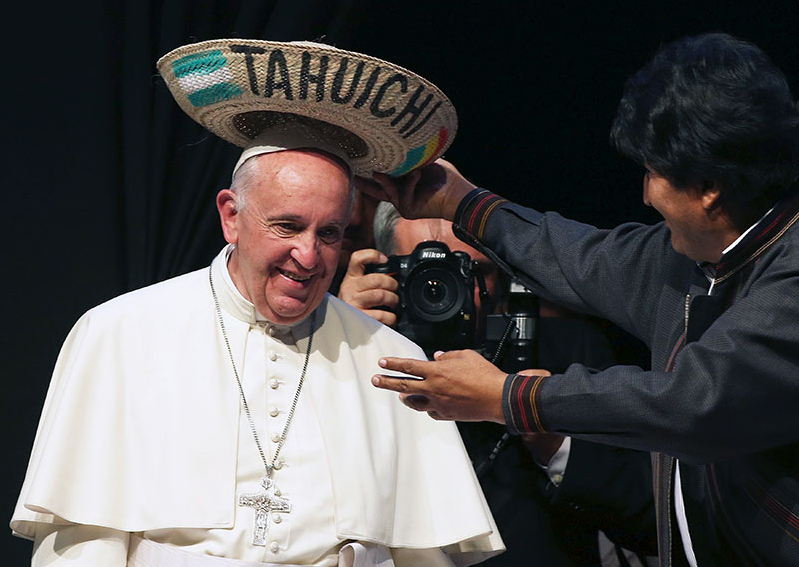
Pope Francis has issued an apology to indigenous people across South America for what he described as "many grave sins" committed against them in the name of the Catholic Church. He made his comments in Bolivia on Thursday.
According to Nicole Winfield of the Associated Press, the pope asked for forgiveness for what happened against the native peoples of Latin America during colonial times. He made the comments in the presence of indigenous leaders, including Bolivian president Evo Morales, who himself is of indigenous descent.
"Grave sins were committed against the native peoples of America in the name of God," Francis said. "I would also say, and here I wish to be quite clear, as was St. John Paul II: I humbly ask forgiveness, not only for the offenses of the church herself, but also for crimes committed against the native peoples during the so-called conquest of America."
Winfield reported that the pope received applause for his apology. He then deviated from his prepared script.
"I also want for us to remember the thousands and thousands of priests who strongly opposed the logic of the sword with the power of the cross. There was sin, and it was plentiful," Francis said. "But we never apologized, so I now ask for forgiveness. But where there was sin, and there was plenty of sin, there was also an abundant grace increased by the men who defended indigenous peoples."
Adolfo Chavez, a leader of a lowlands indigenous group in Bolivia, accepted the pope's apologies.
"We accept the apologies. What more can we expect from a man like Pope Francis?" Chavez said. "It's time to turn the page and pitch in to start anew. We indigenous were never lesser beings."
According to Winfield, the pope's apology to indigenous tribes was significant. That's because there was controversy in South America during Pope Benedict XVI's visit to Brazil in 2007, where he defended the Church's campaign to reach out to the natives and did not apologize for the Church's actions.
"He said the Indians of Latin America had been 'silently longing' to become Christians when Spanish and Portuguese conquerors violently took over their lands," Winfield wrote. "Amid an outcry from indigenous groups, Benedict subsequently acknowledged that 'shadows accompanied the work of evangelizing' the continent and said European colonizers inflicted 'sufferings and injustices' on indigenous populations."
Vatican spokesman Rev. Federico Lombardi told the Associated Press that Francis wrote the speech on his own. In addition, the pope's apology for the Church's past sins in South America was a "particularly important declaration."
Besides apologizing on behalf of the Catholic Church, Anna Martanga of CBS News reported that Francis turned his focus on "the lowly, the exploited, the poor and underprivileged." He urged for a new economic world order and called on humanity to save the planet from being destroyed by unfettered greed.
"Let us say no to an economy of exclusion and inequality, where money rules," Francis said. "That economy kills. That economy excludes. That economy destroys Mother Earth."
According to Francis, a just economy would guarantee land, lodging, labor, education, health care, sports, recreation and culture.
"It is not enough to let a few drops fall whenever the poor shake a cup which never runs over by itself," Francis said, adding that welfare programs were just "temporary responses."
The pope also argued that "new colonialism" was taking over Latin America in the forms of "corporations, loan agencies, certain 'free trade' treaties, and the imposition of measures of 'austerity' which always tighten the belt of workers and the poor."
The Associated Press reported that Francis favored a "communitarian economy" that involved the "fitting distribution" of the Earth's resources.
"Working for a just distribution of the fruits of the Earth and human labor is not mere philanthropy. It's a moral obligation," Francis said.






